Laura Clarke is 29. She lives in Rugby, with her parents, and her 16-month-old son, Elijah. Every day she shows Elijah a picture of his father, her partner Biniyam Tesfaye. It’s the best she can do: he lives over 3,700 miles away in Addis Ababa, Ethiopia. “He’s missing out on his son, and his son’s missing out on him,” she says. “We show Elijah pictures, but he’s not actually seeing him, so he’s not even using the word ‘Dada’ or ‘Daddy’. The longer this goes on, the more it will affect him.”
Clarke and Tesfaye first got together when she was teaching English at a primary school in Addis Ababa; he was one of her colleagues: “We met on my first day. We were friends for about a month, and then after that, things started to develop,” she says.
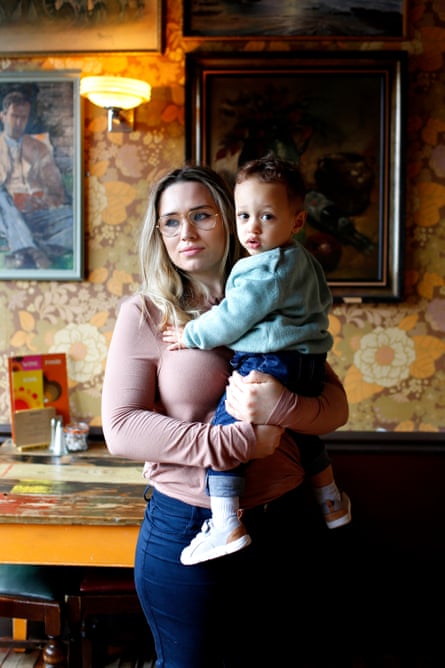
When her job came to an end, Clarke came back to the UK, assuming he could soon join her. “Then about three weeks later, I found out I was pregnant,” she says. “I thought, ‘This is going to make life very difficult, but it’s still a gift – I’m happy. We’ll get through it.’ And that’s what we’ve been doing ever since.”
Elijah was born in October 2016. There was no mobile reception in the maternity ward, so Laura’s mother, Michelle, called Tesfaye to tell him his son had been born. “I was in hospital for two days afterwards,” says Laura. “I saw people with their husbands, and I thought, ‘I should have that opportunity.’” What kept her going, she says, was the fact that Tesfaye had applied for a visitor’s visa and was meant to arrive for a six-month stay that Christmas. But then they heard that the Home Office had turned him down because he couldn’t supply the six months’ worth of bank statements it said was necessary. “That was hard. Really hard,” she says. “You can’t get that time back.” Seventeen months have passed since Elijah was born, and they’re still apart.
Elijah is one of an estimated 15,000 children living without a parent because of restrictions on family visas. Tesfaye would like to live with his family in the UK, but in order to apply to bring over a foreign partner, you must earn at least £18,600 a year. Clarke’s work as a college teacher and PR for a charity brings in an income that is usually “a few hundred a month” short.
Theresa May first announced the idea of a specific income requirement in May 2012, when she was home secretary. Having settled on the idea of doing away with the old insistence that couples and families simply had to live without “recourse to public funds”, she had initially floated a minimum earnings figure for UK citizens of £25,700, before deciding on £18,600, thought to be the amount of money at which people do not need benefits. About 40% of working people in the UK do not earn the required amount.
The details of the rules are bafflingly complex. If a husband, wife or partner wants to bring a child who is not a UK citizen with them, the £18,600 figure rises to £22,400, with an additional £2,400 for each further child. These numbers do not include the fees – which often exceed £2,000 – that the Home Office charges for applications, the equally sizable legal costs many people see as essential to success, or the £400 annual charge people granted visas now have to pay to use the NHS. A mountain of paperwork is also obligatory: among other items, people must prove that a relationship is genuine by sending print-outs of emails, texts and online messages. Shared savings in excess of £16,000 can be used to slightly dilute the income requirement, and if you’ve amassed £62,500 or more, there is no income requirement at all – but for most people affected, these caveats represent cold comfort.
The Home Office explanation is short and sharp. “Those who wish to make a life in the UK with their family must work hard and make a contribution,” a spokesperson says. “Family life must not be established here at the taxpayer’s expense.”
In the early days of her relationship with Tesfaye, Clarke says, she wasn’t aware of the new rules. “Not the £18,600 figure anyway. I just knew that I needed to work. I’d always travelled freely and assumed other people could travel freely. I knew there had been changes, and it was strict, but I didn’t realise it was so restrictive.”
As she sees it, there is a particularly glaring injustice at the heart of the rules. Parents with babies or toddlers, she says, simply can’t put in the kind of working hours that the income requirement demands without running the risk of damaging the development of their children. She currently works four days a week between her two jobs, which obviously pains her. “Elijah’s nursery have said I need to develop his speech more. So I’m working, but every little bit of time I get with him before putting him in the bath, or bed, I’m trying to talk to him as much as possible. Children need one-on-one.”
After Clarke got help from their local MP, Conservative Mark Pawsey, Tesfaye was finally granted a visitor visa, and came to Rugby in April 2017. For six months, he lived with Clarke and Elijah at her parents’ house. “That’s when he really bonded with Elijah, and that’s what I wanted. That’s the most important thing for me,” she says. They held a christening. Tesfaye joined a local five-a-side football team. They also thought about getting married while he was in the UK, but found out it would break the terms of his visa. He went back to Ethiopia last October, and resumed a relationship with his family almost entirely through Facebook Messenger. “Internet access is limited in Ethiopia,” says Clarke. “We can’t do video – it just cuts off.”
Six months before Tesfaye left the UK, the supreme court ruled that parts of the spouse visa rules threatened to breach Article 8 of the Human Rights Act, which sets out the right to a family and private life. The government eventually responded by allowing for new considerations including “credible guarantee of sustainable financial support from a third party” in “exceptional circumstances”, relating to “unjustifiably harsh consequences for the applicant, the partner or a child under the age of 18 years old”.
The Joint Council for the Welfare of Immigrants (JCWI) says it “has seen no evidence that these changes have had any effect on decision-making at the Home Office”. But Clarke and Tesfaye think they offer a glimmer of hope, and are planning to put in an application for a six-month fiance visa, which would lead in turn to a spouse visa that can be renewed after 33 months (after five years, a husband, wife or civil partner from abroad can apply to settle in the UK). “We’re stressing the fact that Elijah doesn’t get to Skype with his father, that my parents are willing to support us financially, so Tesfaye wouldn’t ever be using public funds,” she says. She points out that as a graduate and experienced teacher, he would easily find work.
I speak to Tesfaye on the phone. His English is perfect; his reflections on their predicament are stoic. Being apart from Clarke when their son was born, he says, was “really hard for me – I had to imagine everything”. His earnings from teaching, he says, restrict how much they can talk on the phone, and even messaging is fraught with difficulty. “Sometimes there’s internet, sometimes not,” he says. When martial law was introduced last year, he couldn’t get online for a month.
Of course, he recalls with fondness the six months he spent in Rugby. “There was no chance for me to work, so I stayed with Elijah most of the time. It was a really happy time. But knowing I had to go back really hurt,” he says. “Now, I have to dream about him.”
The JCWI’s campaign against the visa system and its effects on families has the hashtagged slogan #BringThemHome. Many of the affected families are also members of two Facebook groups: I Love My Foreign Spouse, which has 12,000 members, and UK spouse settlement visa, with just under 10,000. The JCWI wants the government to repeal the “inhumane” minimum-income requirement policy “in its entirety”.
“Forty per cent of people who work in this country are too poor to marry who they want,” says the JCWI’s chief executive, Satbir Singh. “The law has been written to make people unequal. It divides them into groups that have rights and privileges, and groups that don’t.”
Singh, who was born in Essex, has direct experience of the system’s unfairness. His wife is an Indian national, and for a while, the two of them lived and worked in Washington DC. Changes to the immigration system instigated by President Trump meant they had to leave. He went to London; she travelled to India. They soon decided to try to settle in the UK, but the fact that he was working as an independent consultant meant a delay to his wife joining him: if you’re self-employed, the Home Office demands that you have been earning the required amount for at least a year before an application for a spouse visa is even considered.
He then got his current salaried job, but there were problems even then. The Home Office lost the couple’s paperwork and eventually refused his wife’s case. Singh wrote a blogpost, comparing his situation with that of Meghan Markle and Prince Harry, who had just announced their engagement. The article, titled As Meghan Markle Chooses To Become A British Citizen I Just Wait For My Wife To Be Able To Come Home, went viral. Three days later, the Home Office reversed its decision. “That’s obviously great,” Singh says, “but it’s not how the system is supposed to work. Most people won’t be able to do anything like that.”
Mandy Williams and George Okoth have a two-year-old son, Eric. Williams lives with Eric in Highbridge, a 6,000-population town next to Burnham-on-Sea, on the Somerset levels. Okoth is in Mombasa, Kenya, 4,500 miles away.
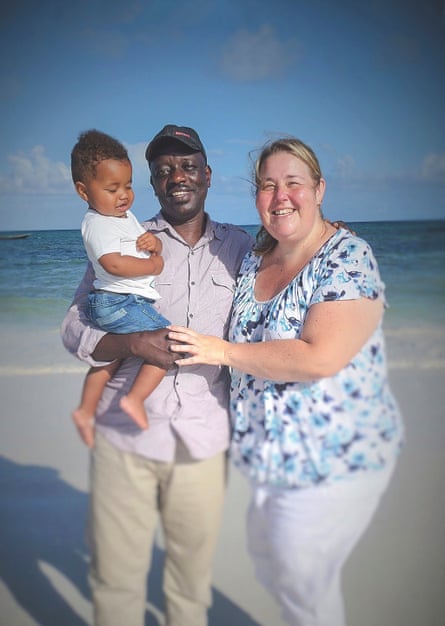
“I think about it all the time,” says Williams. “Silly things, like going to the shops: it’s like, ‘If George was here, we’d be doing this together. We should be cuddling up on the sofa and watching a movie.’”
They send each other 40 or 50 WhatsApp messages a day, in an attempt to create the rhythms and rituals they would follow if they lived together. “He knows I’m home safe, he lets me know he’s home safe – all of that. He’s always asking about Eric. I send photos when I can: ‘He’s walking, he’s talking.’ Because George missed all of that. He missed Eric’s first walking, his first teeth coming through. It’s not the same when you text somebody and go, ‘He’s walking now.’”
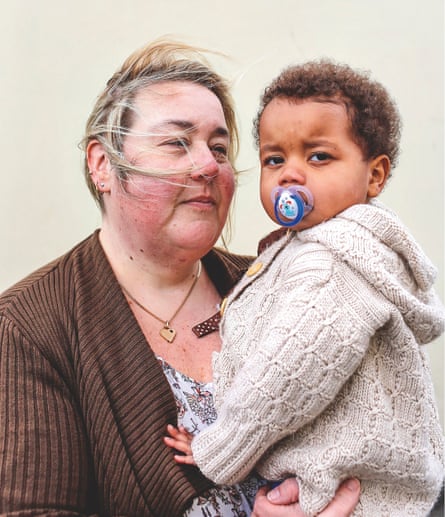
The couple first met when Okoth was in charge of a national tour by a Kenyan youth choir who spent time near where she lives. “It was quite a quick romance, really. We just clicked.” She realised things were serious when the choir left for Scotland and she missed him terribly. Just after he returned to Kenya, Williams found herself unexpectedly pregnant. She was 42.
While we chat in the sitting room of her compact house, Eric entertains himself with a picture book, the TV and a new Google Home speaker that occasionally emits animal noises. “There’ll be times when he’s playing, and all of a sudden, he’ll just come up to me and say, ‘Daddy’,” she says. “And we’ll pick up the phone and look at pictures. He’ll sit and swipe through the photos and always point him out: ‘Daddy.’” Eric has met his father only once: in October last year, Williams, her 18-year-old son, Archie, and Eric went to Kenya, and lived with Okoth as a family for three weeks. When they left, she says, Okoth “went into a depression. He struggled for the first month or so, just to get out of bed”.
Okoth has applied for three UK visitor visas, and been turned down each time. Their best hope lies in applying for a fiance visa, getting married, and then going for a spouse visa. But the minimum salary requirement makes this almost impossible: in her job as the finance manager of a primary school, Williams gets a salary of about £12,000. “I’m far off,” she says. “Far off. I work part-time, and childcare costs are just horrendous. There might be a full-time vacancy available, but if I work full-time, Eric has to go into childcare longer, and I’m not ready for that. He’s already missing one parent: it’s not fair for me to put him into childcare so he’s missing two.”
The earliest she might be earning enough, she thinks, might be in 2020. So in the meantime, she, Okoth and their son will have to carry on trying to sustain their online imitation of family life. “What can I do?” she says. “It’s hard. We even had a little dispute this morning about something. And the worst thing is, it’s all by text.” Okoth tells me from Kenya how hard it was to miss Eric’s birth. “It was very difficult to be so far away. I felt helpless. I wanted to share that wonderful moment and hold my newborn son,” he says. How is he now? “I try to keep positive. I don’t know if I will ever live in Somerset but I really hope so. Hopefully I can get a job, support Mandy and Eric; be a real family and be a role model for my son.”
Tom Shelton is 42. He married his wife, Annie, in 2014, and began life as a family with her son, Dandan, who’s now five. For the moment, Shelton lives with his mum in her terrace house in the former steel town of Consett, County Durham. The day I arrive to speak to him, a dusting of snow lies on the pavement. His wife and her son, meanwhile, are stranded in the Philippines.

In his 20s and early 30s, Shelton worked as a builder and plasterer. But in about 2008, when work dried up in Consett, he fell into the footloose life of an expat, first finding a job selling wine in Singapore, then getting involved in the property trade in the Seychelles. He met Annie on a between-jobs break in the Philippines: after an eight-month relationship, they got married. Dandan is her son from a previous relationship, but was only a toddler when Tom became part of their lives. “By birth, he’s not my son, but in every other respect, he is,” says Shelton. “He speaks great English. It’s wonderful being his father.”
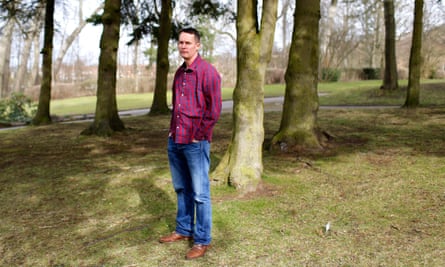
Soon after the wedding, Shelton made plans to take a job in Mauritius. His thinking was that Annie and her son would move there with him. But confirmation was delayed – and in the meantime, he temporarily returned to County Durham. “We assumed it’d be very easy for Annie to come to the UK, see all the sights, meet my family, and then we’d relocate to Mauritius,” he says. But her application for a visitor visa was rejected. “She didn’t have property in her name. She didn’t have a job at that time. They thought there was insufficient evidence of her intending to return to the Philippines.”
They applied twice more, spending £10,000 on Home Office application fees in the process. In the meantime, the job in Mauritius fell through. On their third try for a visitor visa, Shelton says, the reason for refusal changed: this time, it was because the Home Office thought he didn’t have the financial means to support Annie and Dandan. “It put a massive strain on our relationship,” he says. “And at that point, I said, ‘I’m going to pack my bags and come to the Philippines. That’s it.’”
He pauses. “I never really wanted to go and live in the Philippines. It’s a beautiful country, but it’s got its issues, right? I knew it wasn’t going to be a comfortable place to live. You get various warnings: ‘Don’t go to this place, don’t go to that place.’”
Annie’s family are from the island of Mindoro, which has an economy split between tourism and farming. She and Shelton both had savings to draw on, and thought they could see a viable future. “We decided to buy some land,” says Shelton. “We bought a coconut plantation, two hectares – beautiful land, with a river running round it. The plan was to build a house there, and start a farming business, with some pigs, and live the good life.”
Things started to go wrong when a local trader bought 60 of their pigs, promising to pay them within two weeks, and then failed to honour the agreement. Then, near Christmas 2015, disaster struck. Annie’s father was due to transport a lorry-load of the couple’s pigs to a coastal resort, where they would be sold. But they lost contact with him and his co-driver for five days, only for the police to find them horribly beaten up, and abandoned in woodland. The lorry and its load, says Shelton, had been hijacked; the people responsible were later found guilty of attempted murder and jailed. To make things worse, at around the same time, Typhoon Melor had nearly destroyed their home.
“It was incredibly difficult to deal with,” he says. “Emotionally, we were at a very low ebb. I knew I had to do something drastic, to pull us out. So I made a decision to come back to the UK.” This was in early September 2017: he has been in Consett ever since.
“It was hard,” he says, welling up. “But I knew I could get some work, and look after my family.”
Having resolved to apply for a spouse visa so Annie and Dandan could live with him, Shelton began looking for work. He says he applied for about 50 jobs – in sales, mostly – but found that the big hole in his CV left by his time in the Philippines always counted against him. He is now self-employed, working as a plasterer – and, he says, earning enough money to meet the £22,400 threshold required if Annie and Dandan are going to come to the UK. But there is a snag: self-employed people have to submit a record for a full financial year, which means they will have to wait for at least 14 months to apply.
Now, online conversations seem to provide a flimsy approximation of contact, and intimacy. “We Skype as much as we can, and I’m working every day I can,” he says. “They’re eight hours ahead. I wake up at 6.30am, and get ready for work, and we catch 10 or 20 minutes. And that’s pretty much it.
“I don’t know if I can do a year without my family,” he says. “Emotionally, I don’t want to be separated from them for another day.” He would like to visit the Philippines more often, “but how many times can I do that? It eats into everything”.
Two weeks later, I chat on Skype with Annie. Over 20 minutes, the sound occasionally dwindles to a watery burble, and her image often becomes hopelessly pixelated. For two months, she says, she has been working in a resort on the island of Parayan. “It’s safer for me and Dandan here,” she says.
Dandan appears on the screen. “He misses his daddy, every single day,” she says. “He cries, especially when he wakes up in the morning. He asks for Tom.”
The picture degrades to coloured blobs again; her voice starts to fade. “I’m very upset,” she says. “It’s very unfair. It shouldn’t be like that. The government should let families be together.”
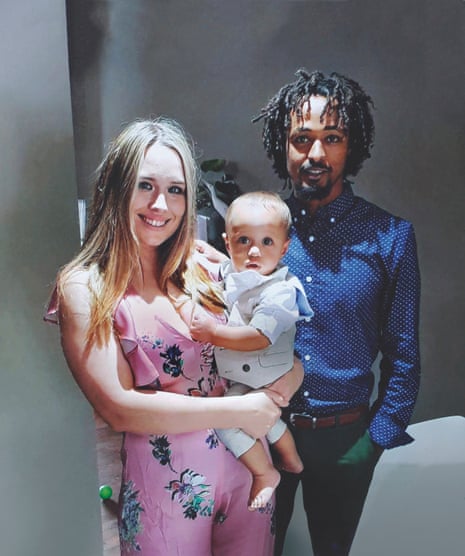
Comments (…)
Sign in or create your Guardian account to join the discussion